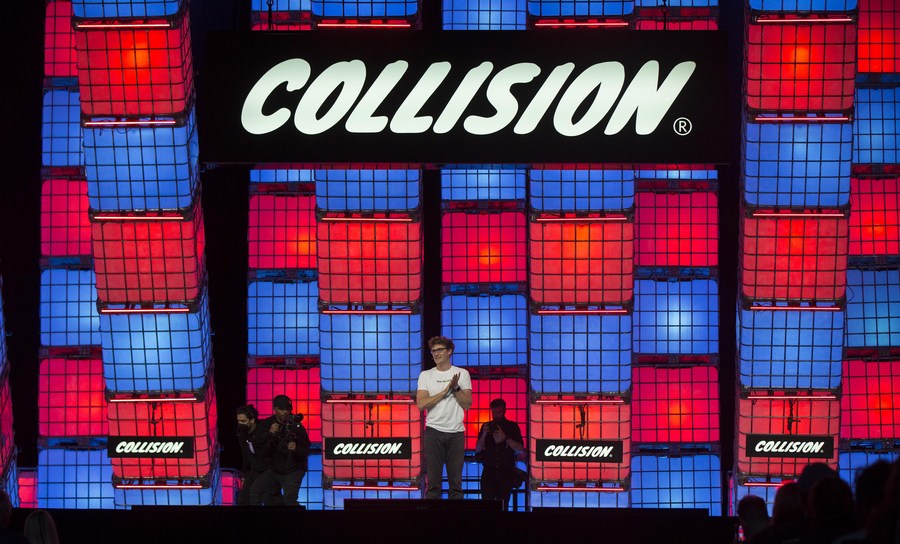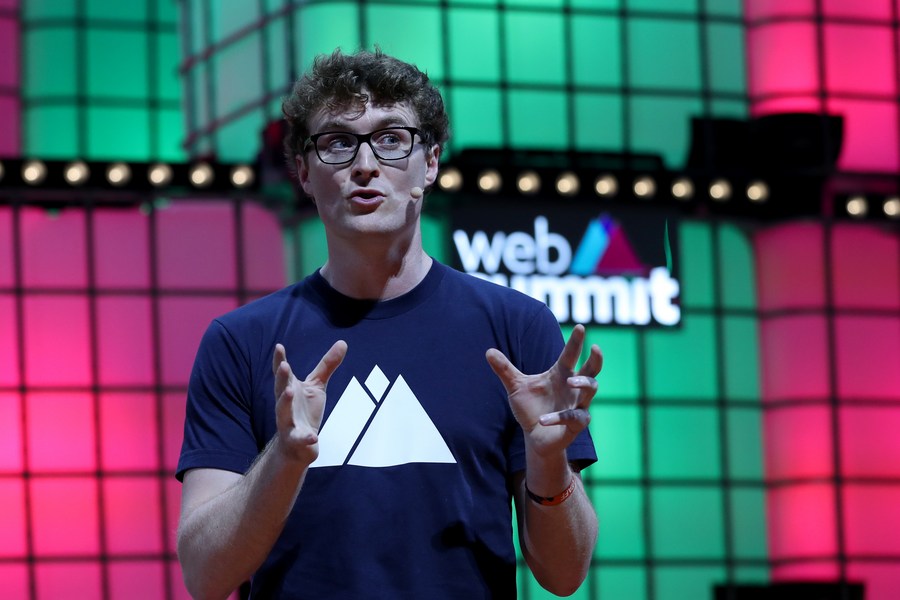
Paddy Cosgrave, CEO of Web Summit and Collision, speaks during the opening night event of the 2022 Collision Conference in Toronto, Canada, on June 20, 2022. (Photo by Zou Zheng/Xinhua)
"In the aerospace sector, COMAC in time will be a competitor of Boeing and Airbus and I have no doubt they will make planes as successfully as Airbus and Boeing have been making them and they'll probably be cheaper, and they'll probably be lighter," said Paddy Cosgrave, the founder and CEO of Web Summit and Collision.
by Martina Fuchs
TORONTO, June 21 (Xinhua) -- China is progressing rapidly in the development of aerospace, quantum computing and electric vehicles, which lead to more innovative competition, Paddy Cosgrave, the founder and CEO of Web Summit and Collision, two of the world's largest and fastest-growing tech conferences, said Tuesday in an interview with Xinhua.
Asked about his views on China's technology developments over the next couple of years, Cosgrave said: "I think it's firstly quite phenomenal. It was really interesting seeing Huawei file for a patent for a quantum computer chip. I think progress in semiconductors is moving faster than anybody expected."
Last week, Chinese telecom giant Huawei announced a patent for a quantum chipset and said it would now dive into the world of quantum computers.
"I'm particularly interested in the progress of COMAC (Commercial Aircraft Corporation of China)," Cosgrave said.
"In the aerospace sector, COMAC in time will be a competitor of Boeing and Airbus and I have no doubt they will make planes as successfully as Airbus and Boeing have been making them and they'll probably be cheaper, and they'll probably be lighter," he said.
"I think that's good for the industry as a whole, that will inspire Boeing and Airbus to become even more innovative than they already are. I think competition is a good thing," the CEO continued.
"We're seeing the same in the electric car industry. I think NIO, amongst others, will make fantastic progress in Europe over the coming years. It's going to be interesting for European car manufacturers. China will remain open, and I think Europe will remain open to Chinese imports," Cosgrave said.

Paddy Cosgrave, CEO of Web Summit, speaks during the Web Summit in Lisbon, Portugal, Nov. 4, 2019. (Photo by Pedro Fiuza/Xinhua)
More than 35,000 people from around the world have convened at the Enercare Centre in Toronto this week for the largest tech event taking place in Canada since the COVID-19 pandemic began.
Over 900 speakers, 1,500 startups, 1,200 journalists, 850 investors and 100 unicorn companies are expected to gather to discuss topics covering technology, artificial intelligence, data science, finance, autotech, and digital media.
The executive said that he also plans to further expand global footprint with additional conferences. "We're continuing to create regional events. Web Summit is our mothership in Lisbon, that's our annual global gathering, and as the years have passed, more and more people have been coming from South America, Africa, the Middle East, and Asia."
"We want to go to those markets to increase the brand awareness of Web Summit. In 2023, we're going to Rio de Janeiro, we've done a deal with the city, with the government and we're looking forward, we hope, to going to the Middle East and going to more places in Asia and Africa in 2024, 2025."
Cosgrave added that the RISE conference, which is one of the most important media and tech industry summits for the Asian region and also produced by the team behind Web Summit and Collision, will return to Hong Kong during March 21-23 in the AsiaWorld-Expo.
"We started RISE just over five years ago. It's our baby, our little sister conference in Hong Kong," he told Xinhua. "For us, it's a perfect meeting place for the East meeting the West, or the rest of the world."
"Historically, we've brought some of the most interesting Chinese founders and investors together with some of the most interesting entrepreneurs and investors from the rest of the world. We've been so sad that we haven't been able to do it since 2019 but we hope in 2023, we'll be back in Hong Kong," Cosgrave said.
With demand for in-person events increasing rapidly, the number of Collision attendees has grown by 40 percent, from 25,711 in 2019 to 35,562 from 130 countries in 2022, Collision said in a press release.




 A single purchase
A single purchase









